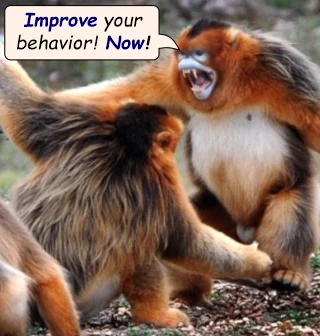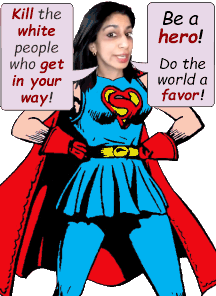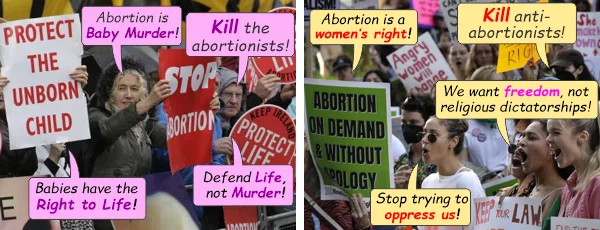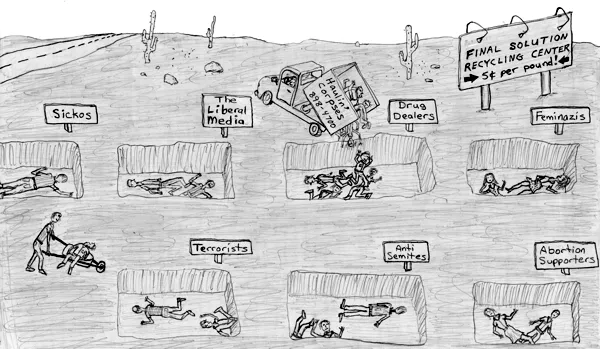In June 2022 the court did as predicted and reversed
the law. Considering that it was obvious that
reversing the law would result in a lot of anger,
the
judges should
have made an attempt to reduce the anger
by providing an intelligent
explanation for why they reversed a law that had
such a significant
effect on American culture.
For example, they should have explained how the nation would benefit, what they were trying to
accomplish, and what sort of
disadvantages they anticipated.
Instead, they justified
it with some vague adjectives, such as saying
that the original decision was "exceptionally weak", "an abuse of
judicial authority", and "egregiously wrong".
Why would they ignore
the
people who were insulting one another, protesting, and threatening to
kill one another?
Is the
Supreme Court trying to
instigate
fights?
If the leaders of a
business, school, or orchestra were to reverse a policy, resulting
in their members arguing with one another, they would do something to reduce the anger,
not allow their team to be disrupted. Likewise, if
parents
were to reverse a policy, causing their children to fight with one
another, the
parents would try to calm the children
down.

Why would judges
in such high
level leadership positions have no desire to
reduce hatred, death threats, and protests?
And why do they not want to identify the secretive person who told
journalists about their plans in May?
I think it is because their goal was to instigate fights,
not improve American culture.
A few days later the court
announced that the U.S. Constitution allows public school
employees to pray in front of their students. Although that decision
did not create as much anger, some Jewish groups began whining
that it might ruin their lives, and this
Jew claims to " know from
experience" that the court's decision is " supremely wrong".

|
|
|
One of the primary goals of
the U.S. Constitution was to prevent the government from pushing a
religion on the citizens. It was the first
amendment to the Constitution, undoubtedly because it was so important
to the people writing the Constitution.
Therefore, the court should have
explained why they were promoting praying in schools, how the nation
would benefit, and how that
decision does not violate the First Amendment.
However, once again the judges showed no desire to justify their
decision or
encourage people to remain calm. I think that their lack of concern
about reducing the anger is more
evidence that they made
that decision only
to instigate fights.
Update: 16 Nov 2022
In case you wonder
why the Court would want to instigate fights by opposing abortions and
promoting school prayer, one
possible reason is to make people
angry at Donald Trump, since Republicans are the primary supporters of
such policies.
An example of the desperation of the Democrats is this
article about two mysterious organizations that boast
about supporting free speech
but are trying to disqualify Donald Trump from the 2024 presidential
election.
They do not want to provide a candidate who can beat Donald Trump in a
fair election, so they look for ways to
manipulate, deceive, and cheat. Their attempts to convince us that
Trump was colluding
with the Russians seems to be failing, so perhaps they are
experimenting with some new tricks.
|
Although the fighting over the abortion issue decreased significantly
after a couple of months, the possibility that the Supreme Court judges
were
trying to instigate fights brings up two
interesting and
important issues:
1) Why is it so easy to
instigate fights?
2) Who
is advocating righteous
killings?
1) Why
is it so easy to
instigate fights?
The social animals are
constantly competing for leadership, especially the
males. The males have the attitude that they should be the dictator
of their group, and they regard other animals as inferior.
When they encounter an animal that irritates them, their solution is to
use intimidation and violence to force him to change his
behavior.
Humans inherited those crude emotional cravings, which is why we want
to:
• Regard ourselves as superior to other
people rather than equal to
them.
• Give orders rather than receive orders.
• Want praise rather than constructive criticism.
• React with anger when
irritated, rather than analyze
the situation.

Our emotions are so crude
that we react
with anger when we are irritated by inanimate
objects and intangible
software.
To instigate a fight between people, all we have to do is arrange for
the people to irritate one another.
We can do this very easily by starting a discussion
about a topic that they disagree on.
Since each of us
is an
arrogant monkey, we regard the people with different opinions as being
stupid, uneducated, or mentally ill. We are easily irritated by
their "inferior" qualities, which stimulates our anger.
Children often react to conflicting opinions by "running
away and hiding", but adults often react with anger.
This can result in insults, sarcasm, angry facial expressions,
demonstrations in the street, beatings, and murders.
It was acceptable for prehistoric people to react with anger when
somebody irritated them because they would not have been irritated very
often. They lived in small tribes of close relatives, and there was not
much of a difference between the people in regards to their
opinions, behavior, clothing, or other culture. Furthermore, the
prehistoric people were in much better physical and
mental health compared to people today, so there was less
abnormal behavior.
Today, however, we live in direct and indirect contact with billions of
people of different races, cultures, intellectual abilities,
educational levels, emotional characteristics, mental illnesses, and
physical disorders. We must also deal with issues that
prehistoric people never had to deal with, such as organized
religions, crime networks, illegal immigration, government corruption,
homeless
people, abusive business executives, telemarketing, spam email,
inflation, traffic congestion, and Zionism.
Our modern era is causing us to frequently
become irritated by
somebody's behavior or opinions, and that results in our anger emotion
being stimulated significantly
more often than during
prehistoric times.
If it were possible for us to put probes in our mind and keep track of
all the times we become angry, and if we could go back in time and put
the probes into the prehistoric people, we might find that
prehistoric people became angry with one another an average of only once
a month, whereas today some people become angry dozens
of
times each day.
 |
|
We routinely
become annoyed with some of the passengers
of airplanes and trains.
|
We can become angry several
times a day simply by traveling a short distance in an automobile or
public transportation. In addition to being annoyed by traffic
congestion, we are annoyed by some of the people, such as the man in
the photo to the right who is eating on a New York City subway, which
was not
intended for eating food.
When we watch a 30 minute television news report, we can become annoyed
several times at the events that are occurring in the world, and by the
advertisements.
Some businesses create advertisements that are intended to
fool us, such as the advertisement that made it appear
that cell phones could pop popcorn. Businesses consider those type of
advertisements to be "clever" and "entertaining", but I think they are irritating.
I am not
entertained by deceptive advertisements.
We are also frequently irritated by modern technology, such
as software and machinery, and by locks,
keys, passwords, and other crime-related items.
Modern humans are irritated so frequently
that I suspect that it is causing us
to get into the habit of ignoring problems and suppressing
our anger, which has the detrimental effect of causing us to become passive
victims of abuse.
As I pointed out in previous documents, humans have a
violent temper
because that is an animal's only method of solving problems. For
example, when a prehistoric man lost his temper with somebody, he may
have
reacted with violence, and that in turn can cause the irritating person
to suffer in life as a result of injuries, or because it lowered his
position in the social hierarchy.
That violence would be unpleasant for
everybody, especially if it was directed against a child, but it
would have been a very brief event,
and it would have been beneficial to
the group because it would cause the lower quality people to be less
successful at reproduction and leadership. However, modern culture
forces us to suppress
our anger, and this allows the low-quality people to
survive and reproduce, and get into leadership positions.
Today we need some type of security force, courts, and quality control
agencies to deal with the low-quality people, but our police, military,
courts, and
other
law enforcement agencies have become dominated by criminals,
blackmailed puppets, Zionists, and lunatics. This allows
the badly behaved people to live among
us, torment us, and get into influential positions in
journalism, law enforcement, government, universities, businesses,
churches, and other organizations.
2) Who
is advocating righteous
killings?
All animals are naturally
peaceful, and they become violent only when they are irritated or
frightened. Humans inherited that characteristic, but I think that as
humans evolved, we became less selfish and violent, and developed a
stronger desire to work in a team and protect one another.
Humans are more
aware of, and concerned about, the suffering of other people, including
people who are outside of our particular social group. We are
even concerned about the destruction of plants and the
suffering of animals.
Although we want to protect
people, plants, and
animals, we also have a desire to kill the "bad" people,
plants, and
animals. Unfortunately, there is a significant
difference between us in regards to which people
we put into the
category of "bad".
For example:
|
•
|
Some people
believe that they will protect us from drug
abuse by killing drug dealers. |
|
|
•
|
Aruna
Khilanani boasted
that she wants to kill "white people"
who "get in her
way".
|
|
|
•
|
Some people
want to
protect us by killing
Holocaust deniers, climate change deniers, racists, sexists,
homophobes, misogynists,
anti-Semites, or supporters of Donald Trump. |
|
|
 |
|
Can we
kill the brown
people
who
"get in our
way"?
|
|
We enjoy hurting people, also
In addition to advocating
the killing of "bad" people,
we also enjoy tormenting
them. For example, many people have publicly announced that they want
some particular criminal to suffer in
jail for the rest of his life
rather than be
executed.
Furthermore, if that criminal commits suicide, some people
complain that
they have been denied the
satisfaction of knowing that he is suffering in jail. Those people
don't want to merely remove
criminals from society. Rather, they want to torture
them for the rest of their life.
 When
we are irritated by a rat, flea, or other creature, our emotions want
us to react with violence, but only a few people go to the trouble
of hurting animals,
such as the man who tortured the rat in the photo
to the right. However, a lot of us, perhaps all of us, have trouble
refraining from hurting people.
We get so much emotional pleasure from hurting people who irritate us,
and it is such a
popular activity, that our language has a lot of different words to
express it. For example, we refer to our violence as " getting
revenge", and we describe "revenge" as " sweet",
and as " best
served cold". We also have lots of other words to express our
craving to hurt people, such as retaliation, vengeance, reprisal,
avenge, repay, and payback.
“I want justice to be served”
All cultures today are
encouraging us to create the false
image that we are opposed to violence. There is no
culture that encourages people
to acknowledge the evidence that humans are just a variation of a
monkey, and
that we have the same crude, animal characteristics that other monkeys
have.
The pressure that we are under to pretend that we are peaceful
creatures results in most people refusing to admit that they enjoy
hurting other people. Therefore, when they want to hurt a criminal,
most people describe it as "serving justice"
rather than as "torture"
or "getting
revenge". Only a few people can admit that they enjoy hurting
people, animals,
and inanimate objects.
How is life in prison better than executions?
Some people boast that they
are so peaceful that they oppose the death penalty. They boast that
instead of killing
criminals, they want to put them in jail or a mental hospital for the
rest
of their life.
Whether putting a person in jail forever is more peaceful or kind than
executing him is a personal opinion, not a right or wrong decision. My
opinion is that putting people in jail forever is a way to torture them,
whereas executing them is "putting them out of their misery" and
allowing them to avoid a life of suffering. Furthermore, putting people
in jail forever is a burden on
society, which in turn means that it is detrimental to all of us.
Putting a person in jail or a mental hospital brings
us emotional pleasure because it allows us to hurt the
person without
feeling the guilt of killing them. However, putting people in
jail forever is as useless and burdensome as
putting
fleas, rats, cockroaches, and mosquitoes in jail.
Are humans peaceful or violent?
We boast about being
peaceful while at the same time we advocate
killing some people and tormenting others. Why are we so hypocritical?
The only way to understand this hypocrisy is to analyze the mind of an animal because a human brain
is
just a variation of a monkey brain,
not the intelligent creation of a supreme being, or a piece of clay
that molds itself to the environment.
The violence and hypocrisy that we see in humans is identical to
that
of all of the other social animals, especially the animals at the top
of the hierarchy. The dominant monkey, for example, reacts with violence
towards any monkey that irritates him.
The monkeys at the bottom of
the hierarchy, by comparison, are more likely to have the attitude of a
liberal, socialist, child, or Marxist. Specifically, the low-level
monkeys are likely to want pity,
handouts,
second chances, and third chances. However, if a low-level monkey
could get into a top position, then he would become just as demanding,
arrogant,
and selfish as
the other monkeys.
Animals are violent to help one another
It is important to realize
that the dominant monkey does not regard
himself as being cruel, or as hurting other monkeys, when he hits
them
or glares at them. Rather, he regards himself as a compassionate and
responsible leader who is trying to help
the badly behaved monkeys improve
their
behavior, which in turn helps the entire group.
|
|
Animals
use
violence to improve
one another's behavior and keep the team working properly, not to hurt one
another.
From the point of view
of the dominant monkey, he is a hero
when he intimidates and hits the badly behaved monkeys.
He considers himself to be improving his team.
|
|
 |
When high ranking chickens
pluck feathers out of the low ranking chickens, it appears to us to be
a form of cruelty and torture, but it is nature's way of having stupid
animals improve their group, and improve the genetic qualities of the
future generations.
The low ranking animals that suffer from the violence and temper
tantrums of the higher ranking animal could be described as "collateral
damage". In other words, their suffering is not the purpose of the
violence. Their suffering is a "side effect". The purpose of the
violence is to help the group and improve their gene pool.
Humans are violent to help one another
Humans inherited the
animal's
desire to use violence to help one another. However, since our goal is
to help
people, we don't regard ourselves as being cruel or violent, and we
don't regard ourselves as "murderers"
when we advocate the killing of "bad" people. Instead, we regard
ourselves as protecting the "good" people. We regard ourselves as heroes who
are helping to
improve the world. For
example, one of Aruna Khilanani's violent remarks was:
|
"I had fantasies of unloading a
revolver into the head of any white person that got in my way, burying
their body and wiping my bloody hands as I walked away relatively
guiltless with a bounce in my step, like I did the world a favor."
She does not
regard
herself as a murderer. Rather, she
regards herself
as a hero
who is doing
the world a
favor by
killing the "white" people. She expects the non-white
people to praise
her for her killings, not arrest
her
for murder.
|
|
 |

Likewise, the people who want to
kill Trump supporters, climate change
deniers, anti-Semites, racists, and sexists also believe that they are heroes who
are helping to improve the world.
Instead of boasting that humans are peaceful creatures who oppose
murder, we should admit that we are monkeys, and that we
oppose the murder of certain
people, but we support the murder of
certain other people.
Our preference is to hurt people, not kill them
It should be noted that the
dominant male monkey rarely kills
another monkey. His emotions prefer to hurt the
other monkeys physically
and emotionally. Therefore, it should not be surprising to notice that
humans often fantasize about killing
people, but we
rarely carry through with our murderous fantasies. Instead, we usually
restrict ourselves to hurting
people physically and/or emotionally.
We have such strong desires to hurt people that we regularly hurt the
people that we like the most,
such as our children, spouse, friends, and coworkers. However, we don't
regard ourselves as "hurting" people. As with the dominant monkeys, we
regard ourselves as trying to help
the person become better.
For example, when married couples become annoyed with one another, they
often react by trying to hurt their spouse in order to help them
improve
their behavior or opinions. Likewise, parents often hurt their children
in order to help them become more responsible, do better in school, or
behave in a more pleasant manner.
 |
|
Can we
encourage the
punching of "anti-Goys"?
|
The Google executives also enjoy
tormenting people. For example, they allow their
employees to
promote the absurd
concept of " How to Punch a
Nazi",
and they made a public spectacle of the firing of James Damore.
The executives and employees of Google who support the punching of
Nazis or the firing of James Damore believe that they are heroes
for helping the world. They
are proud of themselves.
They do not
regard
themselves as lunatics, criminals, sadists, or oppressors of free
speech.
|





